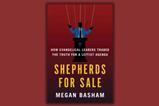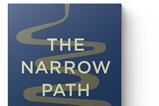Controversy has ensued after an extract from Joshua Ryan Butler’s soon to be published book Beautiful Union was posted online. Widespread criticism of the article resulted in a number of Christian leaders pulling their endorsement of Butler’s book, with some admitting to have never read it in the first place. Thomas Creedy explains what took place

If you aren’t a part of ‘Christian Twitter’, then you might have missed the latest Twitter storm. As someone working in Christian publishing, while it was exciting to have normal people interested in what I do, it wasn’t necessarily on the terms I’d like.
To summarise, the US-based website The Gospel Coalition (TGC) ran an extract from Joshua Ryan Butler’s soon to be published book Beautiful Union. So far, so normal. Except this was a book about sex. And, according to people from across the theological spectrum, it wasn’t very good.
In fact the general consensus was this book was actually very bad - triggering sexual assault victims, encouraging unhealthy attitudes to sex and bodies, and generally being not particularly well thought through.
The article was pulled and TGC released an apologetic statement (the apology didn’t actually engage with the issues raised, but that’s another article).
Some voices have characterised all this as a pile on and mob justice leading to cancellation - but that misses the point that across the spectrum of opinions the extract was seen as unhelpful.
Then the story got worse.
It turned out a number of people who’d recommended the book, and were happy to have their recommendation publicly printed on it - decided to retract their endorsements, in some cases admitting that they’d only read part of the book, or not any of it.
Working for a British publisher, I’m bemused by the idea that you’d endorse a book without having read it. It isn’t something I could ever imagine doing myself. But apparently it’s quite common, and has been discussed before (I first wrote on the topic in 2021).
Endorsements, so the thinking goes, help readers work out if a book is for them. Alongside the cover, the words on the cover, the author, and things like price, length, publisher, topic, endorsements use the trust that people have built to ‘lift up’ the books of others, and persuade you to buy and read them.
Endorsements can be helpful - but at the risk of stating the obvious… they have to be true. Endorsers need to have read the book, although that doesn’t mean they necessarily have to like it! Some of the most helpful reviews and endorsements I’ve ever read are not gushing, but instead recognise the imperfect goodness of the book in question.
I can’t imagine writing a book review of a book I haven’t read through, or passing for press a manuscript I haven’t read every word of. But for those of us in publishing, I think this debacle serves as a reminder of our responsibility to be curators of truth rather than purely profit-driven platform-handlers. I’m reminded of Katelyn Beaty’s helpful Celebrities for Jesus which is a book that I think not just everyone in Christian publishing should read, but also anyone interested in issues of platform and power. (See here for Beaty’s article on the subject of Christian celebrity).
In recent days some have called for new standards around endorsements - and this feels like something our industry needs to be thinking about. Certainly at IVP we expect endorsers to read the book in question - and I’m as grateful to the woman who read a book and came back to me explaining why she wouldn’t endorse it, as I am to the woman who read another book and said she’d only endorse it if the author changed about 10-15% of it. Both those women read the books, critically, but in a friendly way. That’s what we need.
I’m also encouraged by endorsers who are honest, say they are too busy, and suggest others who could do the work instead. I particularly appreciated one author suggesting someone relatively unknown as an endorser - that person gave some great feedback!
Christian publishing can perhaps learn something from secular academia here. Most academic presses will have a ‘peer review’ process - often with an anonymous reviewer, sometimes several. It’s a practice we use at IVP on some of our more technical series - and it’s a great way of catching errors and sharpening a text. I wonder what this could look like for more general books?
As Beaty writes, “our modern conflation of identity and gifting with a personal brand, and the endless quest for platform, has compromised the original mission of Christian book publishing, and many authors besides”. Going forward, Christian publishers need to model a better way by continuing to take risks on gifted debut authors, and working out a way to ensure that endorsers have read the book that is going to be published. I don’t necessarily know what that looks like, but I’d love to have the conversation, and of course all of us in Christian publishing value your prayers.







































No comments yet